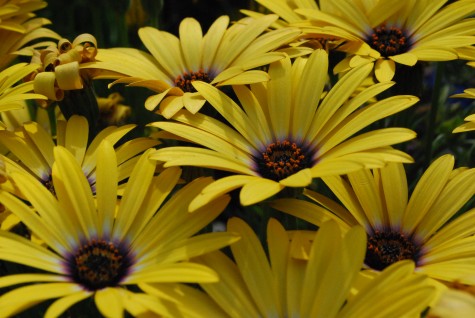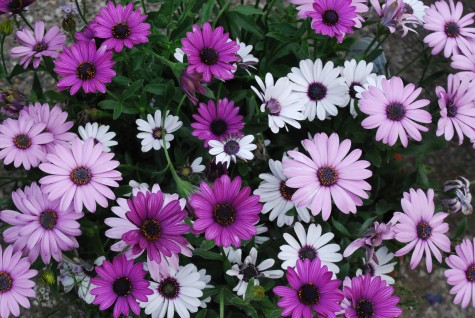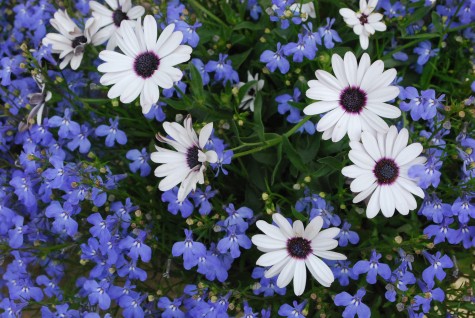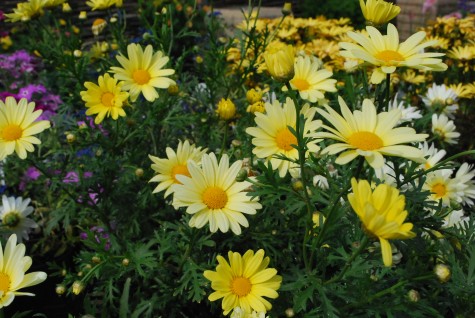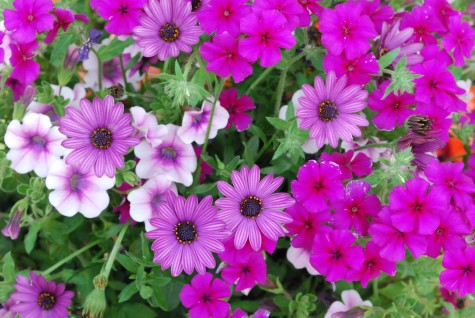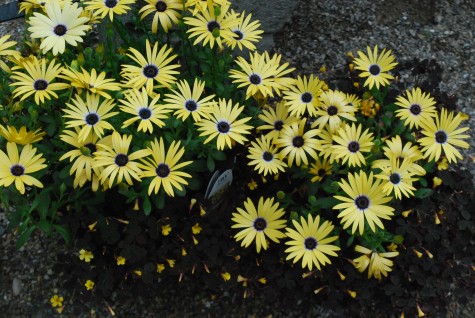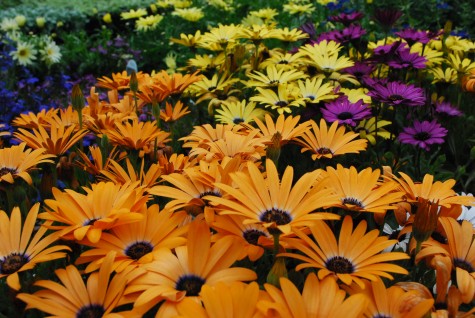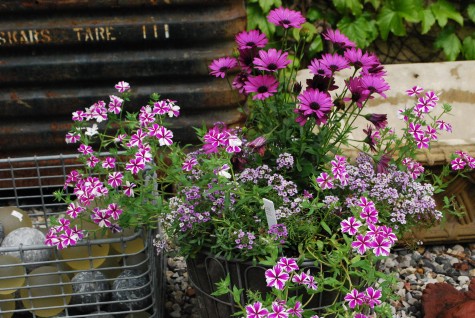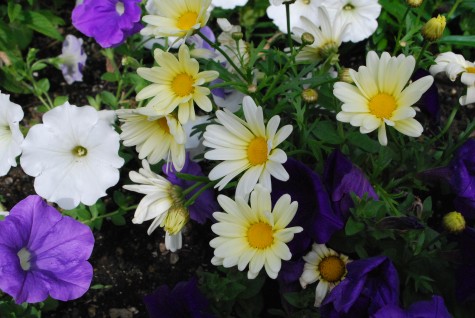At A Glance: Fresh As A Daisy
Planting For Spring
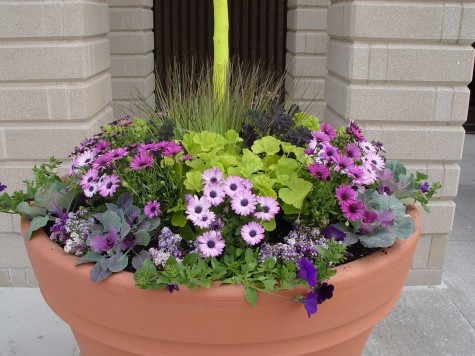 Word has it that we will have night temperatures in the teens and up to 20 degrees tonight-welcome to spring in Michigan. My tulips that are four inches tall-I am hoping blistered and burned foliage will be the only damage. As for my crocus just barely representing themselves-who knows. But as tough as spring can be, there are those plants that are resistant to temp troubles. The charteuse leaved geranium, Persian Queen, can take a lot of cold. Should the cold linger, it will languish; I am not a bit afraid to plant it out April 15, and hope for a steady warm-up. Osteospermum handles cold even better-these daisies that come in a wide range of colors last long into the summer as well. Petunias roll their eyes, and are moodily tolerant-don’t count on them to grow now how they do in hot weather. Alyssum-the workhorse of the spring garden that moves on into summer without any fuss.
Word has it that we will have night temperatures in the teens and up to 20 degrees tonight-welcome to spring in Michigan. My tulips that are four inches tall-I am hoping blistered and burned foliage will be the only damage. As for my crocus just barely representing themselves-who knows. But as tough as spring can be, there are those plants that are resistant to temp troubles. The charteuse leaved geranium, Persian Queen, can take a lot of cold. Should the cold linger, it will languish; I am not a bit afraid to plant it out April 15, and hope for a steady warm-up. Osteospermum handles cold even better-these daisies that come in a wide range of colors last long into the summer as well. Petunias roll their eyes, and are moodily tolerant-don’t count on them to grow now how they do in hot weather. Alyssum-the workhorse of the spring garden that moves on into summer without any fuss.
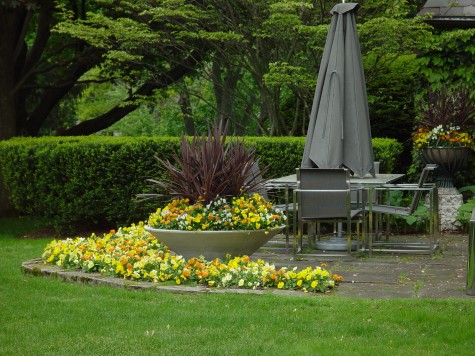 Pansies and violas are a mainstay of a spring garden. I do not use the word mainstay lightly; the longevity of early spring perennial blooming hinges entirely on the weather. Should we have an early warm up, or a late freeze, they fade. Pansies and violas take the ups and downs with equanimity. Some hybrids survive our winters after a fall planting. This is worth some flag waving; in the fall, I can bury tulip bulbs, and overplant the surface with pansies-the spring gratification far outweighs the winter delay.
Pansies and violas are a mainstay of a spring garden. I do not use the word mainstay lightly; the longevity of early spring perennial blooming hinges entirely on the weather. Should we have an early warm up, or a late freeze, they fade. Pansies and violas take the ups and downs with equanimity. Some hybrids survive our winters after a fall planting. This is worth some flag waving; in the fall, I can bury tulip bulbs, and overplant the surface with pansies-the spring gratification far outweighs the winter delay.
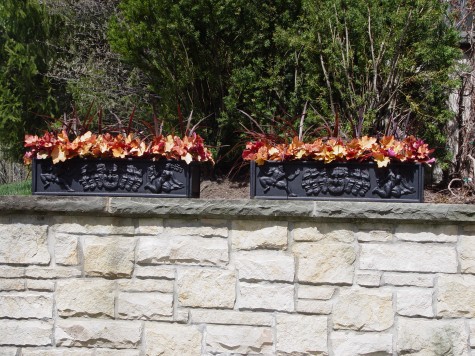 Heuchera has seen a breeding explosion like few other perennials in recent years. Peach, orange and lime foliage-these leaves are seductive. The black leaved varieties don’t send me. Black foliage to me is about drama-what drama is there in a black leaved plant that grows 6 inches above ground level? Black leaves on a dirt background-mud, in my mind. I have never been much of a fan of heucheras in the garden-they need division too often for me. In pots, they shine; I plant them all the time. Their color and shape is beautiful-up close to the eye.
Heuchera has seen a breeding explosion like few other perennials in recent years. Peach, orange and lime foliage-these leaves are seductive. The black leaved varieties don’t send me. Black foliage to me is about drama-what drama is there in a black leaved plant that grows 6 inches above ground level? Black leaves on a dirt background-mud, in my mind. I have never been much of a fan of heucheras in the garden-they need division too often for me. In pots, they shine; I plant them all the time. Their color and shape is beautiful-up close to the eye.
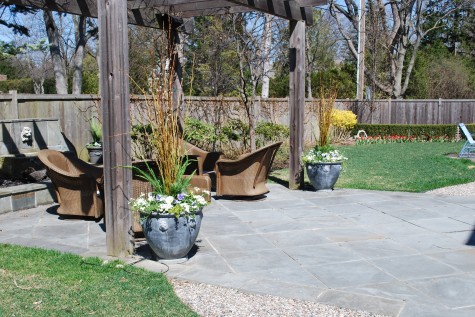 I have an aversion to empty pots come spring-they look so forlorn. One’s winter stick center can be kept on through the spring, but I want to see some real plant life going on, early on. My gardening season is short-best to plan to savor every day.
I have an aversion to empty pots come spring-they look so forlorn. One’s winter stick center can be kept on through the spring, but I want to see some real plant life going on, early on. My gardening season is short-best to plan to savor every day.
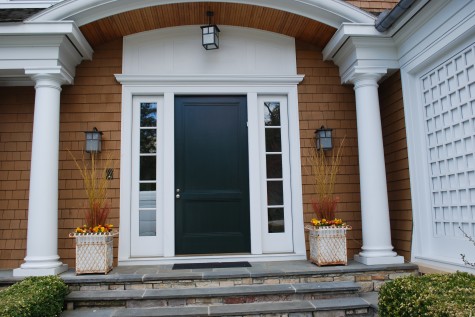 Empty pots at the front door do not exactly say welcome. Nothing in the ground is making much of a move yet-save the hellebore flowers. A nation of hellebores would not warm up this front door-they have an entirely different seat on the garden bus. Low to the ground, they are not so hard to pass over. They need an intimate, traffic stopping space to shine. I am truly sorry they are not more widely grown. However, the fact is, once nurseries get good traffic going on in the spring, the hellebores are finished blooming, and sit there on the shelf, benignly green. It is easy to miss them. When I see my patches of crocus push up in the spring, I always regret that I didn’t add to them last fall. Gardeners need to be six months ahead of the season-how hard is that?
Empty pots at the front door do not exactly say welcome. Nothing in the ground is making much of a move yet-save the hellebore flowers. A nation of hellebores would not warm up this front door-they have an entirely different seat on the garden bus. Low to the ground, they are not so hard to pass over. They need an intimate, traffic stopping space to shine. I am truly sorry they are not more widely grown. However, the fact is, once nurseries get good traffic going on in the spring, the hellebores are finished blooming, and sit there on the shelf, benignly green. It is easy to miss them. When I see my patches of crocus push up in the spring, I always regret that I didn’t add to them last fall. Gardeners need to be six months ahead of the season-how hard is that?
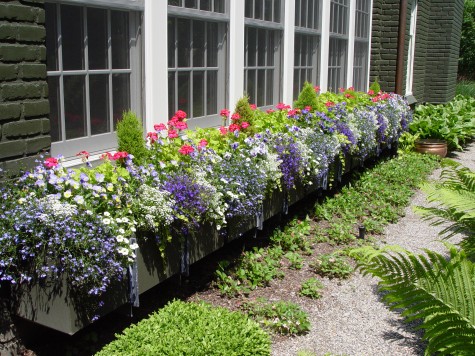 Though spring plants tolerate cold, they thrive in warmer conditions. These south side window boxes put on weight from the moment of planting. The Persian Queen geraniums never skip a beat, and will still look great come October. How lobelia grows here defies everything I had come to believe about lobelia. They will thrive in full son on the south side, if the watering is dead on. This picture was taken the end of June, after an April 1st planting.
Though spring plants tolerate cold, they thrive in warmer conditions. These south side window boxes put on weight from the moment of planting. The Persian Queen geraniums never skip a beat, and will still look great come October. How lobelia grows here defies everything I had come to believe about lobelia. They will thrive in full son on the south side, if the watering is dead on. This picture was taken the end of June, after an April 1st planting.
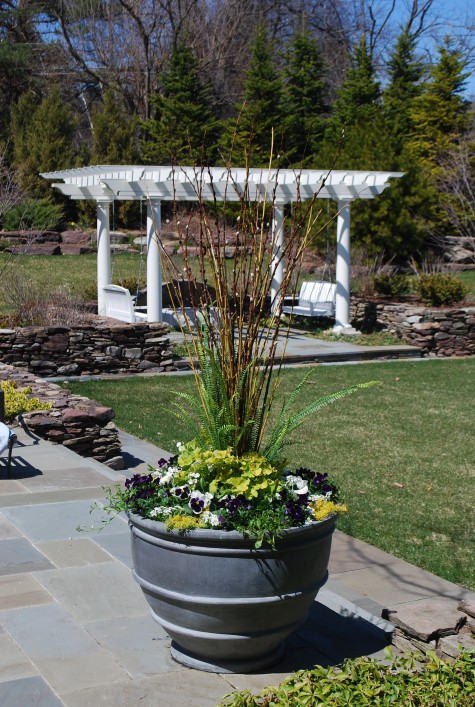 This lead egg cup from the Bulbeck foundry in England is a focal point in this garden. It would not do-for it to be empty in the spring. Too many other spring views depend on its state of dress. The shape, arrangement and placement of landscape elements in this garden look good, given how early the season. A Bulbeck stuffed with spring plants-beautiful.
This lead egg cup from the Bulbeck foundry in England is a focal point in this garden. It would not do-for it to be empty in the spring. Too many other spring views depend on its state of dress. The shape, arrangement and placement of landscape elements in this garden look good, given how early the season. A Bulbeck stuffed with spring plants-beautiful.
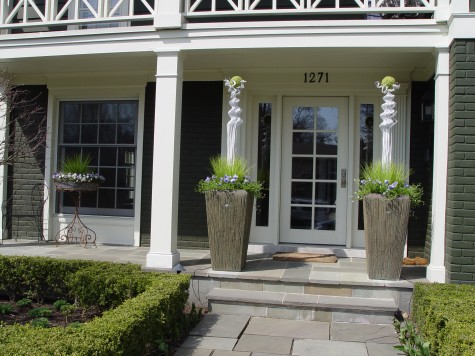
The plants of spring are specific in their color shape and habit. Once the season passes, that look is gone. A long spring-this I like.
